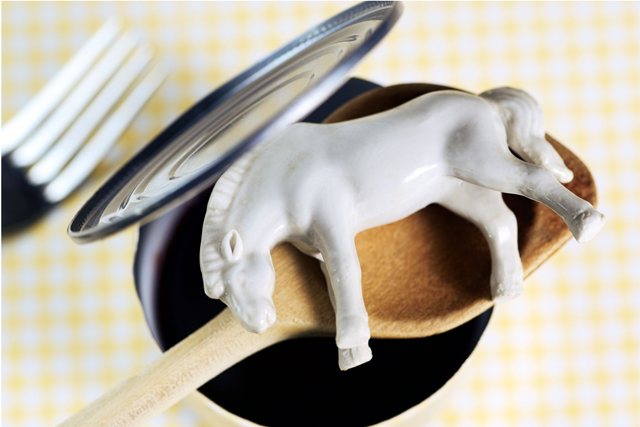Tesco's recall of its frozen Everyday Value Beef Burgers just over a month ago, after horse DNA was found in them, has spiralled into an international scandal. It has involved food producers, suppliers, supermarkets, caterers and restaurants, with Whitbread and Nestle just two of the companies affected - not to mention some schools being forced to remove burgers from their menus.
While many processed-beef products have been withdrawn, the question now is how do brands prevent their reputations from being tarnished further and regain trust.
According to the results of one survey carried out by research agency Consumer Intelligence, revealed last week, the discovery of horse DNA in beef products has prompted many consumers to shun meat. In the online poll, which questioned 2200 adults, one-fifth said they had cut back on purchases in the wake of the scandal. Reports in the national press, meanwhile, indicate that some analysts believe supermarkets' processed-meat sales have suffered a sharp decline.
The 'big four' supermarkets recently held a summit with food-trade groups and the Environment Secretary, pledging to work round the clock to restore confidence in meat products, while retailers are also said to be 'testing products like mad'. In a blog, Tesco chief executive Phil Clarke has promised to introduce 'industry-led benchmarking' on food testing.
With no end in sight to the scandal, and revelations about further products still emerging, what can brands do to put shoppers' minds at rest? We asked Jim Prior, chief executive at brand consultancy The Partners, and Clare Field, a former marketing director at Aunt Bessie's and now a marketing consultant to Sacla UK and managing director of consultancy Lutece.
Horsemeat: the fallout
40% decline in UK sales of frozen burgers in the week to 2 February
29/2500 products tested in the UK contained horsemeat adulteration of more than 1%
Sources: Nielsen, Food Standards Agency
BRAND HEALTH CHECK DIAGNOSIS
Two industry experts on what stores and food manufacturers can do to rebuild trust
Jim Prior, chief executive, The Partners
 The most surprising aspect of the horsemeat scandal is that the public reaction doesn't make it feel like one at all. For a while, Twitter was awash with horsey wit, and as I queued in my local butcher's shop I watched him roll his eyes as customers wisecracked through their orders.
The most surprising aspect of the horsemeat scandal is that the public reaction doesn't make it feel like one at all. For a while, Twitter was awash with horsey wit, and as I queued in my local butcher's shop I watched him roll his eyes as customers wisecracked through their orders.
When Starbucks doesn't pay tax, it's an outrage; when frozen lasagne is made of Shergar, it's a bit of laugh. The business issue is no joke, though: those brands directly involved, as well as the beef industry and its supply chain, will suffer dramatic sales-falls and long-term brand damage.
Remedy
- For brands like Findus, there is no easy way out. After getting their processes in order, they must rename and rebrand.
- The whole approach to declaring provenance must be re-thought. The entire UK beef supply clearly isn't hand-reared on a tiny farm in Devon, as much labelling seeks to suggest.
- For risk-taking entrepreneurs, perhaps the British public's good humour and love of budget lasagne opens a niche market in 100% horse?
Clare Field, Managing Director, Lutece (and former marketing director at Aunt Bessie's)
'All it takes for evil to prevail is for good people to do nothing.' Celebrities accused of child abuse, a lack of patient-care in our NHS and now horsemeat discovered in our beef lasagne.
The price of food has risen dramatically since 2007, and we are seeing costs driven down to the point where someone, somewhere appears to have sanctioned this sort of substitution.
We can demand a re-arming of our Food Standards Agency (FSA) and more testing protocols, but in the end it is the 'good people' who need to ensure that evil does not prevail. Big brands can take the lead on this. They can learn from the small, ethical brands that are growing in relevance to consumers.
Remedy
- Big brands learn from the ethical stance of small brands: they appeal because behind them are real people who are living their values.
- Lead the way by doing 'the right thing' - don't stand by and let price be an excuse.
- Support the reinstatement of greater powers for the FSA.


